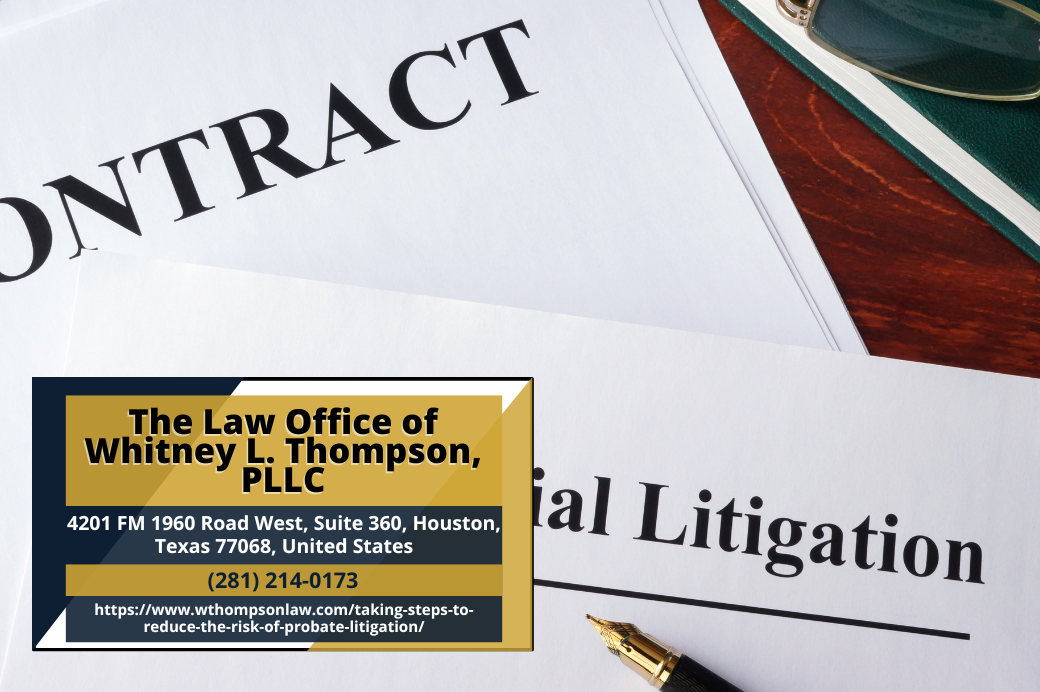The risk of probate litigation can increase due to various family circumstances, primarily stemming from two fundamental issues: disputes over managing a mentally incapacitated family member and conflicts over estate distribution after death. Common factors that often contribute to these disputes include sibling rivalry, second marriages without prenuptial agreements, strained family relationships, and non-standard estate plans. To reduce these risks, consider open discussions with family members, a well-structured estate plan with safeguards for incapacitation, simplified real estate transfers, and documented proof of intended gifts. Taking these proactive steps can significantly lower the likelihood of probate litigation.
At The Law Office of Whitney L. Thompson, PLLC, our experienced Houston probate attorneys understand the intricacies of probate law. We can help ensure that your estate is handled according to your wishes, with the utmost care and professionalism. We can establish comprehensive estate plans that take into account your potential family dynamics and legal challenges, helping to protect your legacy and minimize the risk of costly and distressing probate disputes. Contact us today at (281) 214-0173 to discuss how we can assist you with your estate planning and probate needs.
What is Probate Litigation?
Probate litigation often involves estates with self-prepared estate documents. Handwritten forms from online resources often lead to mistakes that a layperson cannot foresee. The money spent litigating over defectively drafted documents most often far exceeds the cost of hiring an estate planning attorney to prepare your documents correctly. Ensure that you hire a highly skilled estate and probate attorney through trusted recommendations and by looking for meaningful professional peer recognition groups.

Factors That Increase the Risk of Probate Litigation
Probate litigation often arises when intricate or contentious factors are involved in an estate. Here are the primary factors that increase the risk of probate litigation:
- Multiple Marriages: Estates involving individuals who have been married multiple times often face complications, especially when prenuptial or postnuptial agreements are absent. Disputes commonly arise between children from a previous marriage and the current spouse, making these situations particularly prone to litigation.
- Family Relationship Conflicts: Families that have a history of poor relationships are more likely to engage in probate disputes. Actions such as excluding a family member from a will or alleging tampering with estate documents can escalate to litigation.
- Unconventional Estate Plans: Estates that feature unusual stipulations or unexpected beneficiaries often lead to disputes. These may involve significant assets left to unforeseen parties, prompting other potential heirs to contest the will.
- Inappropriate Executor Selection: Choosing an executor who lacks organizational skills or trustworthiness can result in mismanagement or disputes. It’s crucial to select someone capable and reliable to execute the will as intended.
- Outdated Estate Plans: Failing to keep an estate plan current with life changes, such as marriages, divorces, and deaths, can lead to outdated instructions and an increased risk of litigation. Regularly reviewing and updating estate documents is essential to reflect the current family structure and asset distribution wishes.
Preventive measures include thorough planning and clear communication with the help of an experienced Houston probate attorney. Addressing potential issues before they arise can significantly reduce the likelihood of probate litigation.
How to Reduce the Chance of Probate Litigation?
Reducing the chance of probate litigation also requires you to be hyper-realistic about your family dynamics, which is often difficult for a parent since it means acknowledging sibling rivalry and recognizing hostilities in blended family situations. Selecting one adult child over another to act as a fiduciary or medical power of attorney can create conflict and mistrust among siblings. It is often recommended to select a trusted but neutral third party or hire a professional fiduciary to administer your estate.
Fiduciaries exist in many forms, such as patient advocates, guardians, personal representatives of an estate, and trustees. These individuals must make important legal, medical, or financial decisions for the benefit of others. A layperson making these decisions may unintentionally violate their fiduciary duties from a legal perspective, often leading to litigation. It is best to consult your estate planning attorney when appointing fiduciaries to understand the rules and responsibilities they will fulfill.
How an Attorney Can Help You Plan to Avoid or Handle Probate
When you begin your planning process, it is best not to include your beneficiaries. Undue influence over a benefactor can become a legal issue if family members suspect that someone intended to influence the estate decision-making process of the decedent improperly. Undue influence can include behaviors as seemingly innocuous as driving the decedent to the attorney’s office and attending estate planning meetings. Questions about whether the plan truly reflects the decedent’s wishes and who authored the estate plan can lead to probate litigation.
Consider having a medical evaluation if you are concerned about a challenge to your estate plan. Proactively identifying yourself through a doctor’s examination as being of sound mind and body before your estate planning sends a message that you can make these decisions, preventing any challenges regarding your mental fitness. Along the same lines, do not make verbal promises about inheritance that you will not keep. Verbal promises are legally unenforceable and can contribute to someone challenging your estate plan and pointing out inconsistencies in your overall thought process. The best strategy is to manage the expectations of your inheritors honestly and directly by only making promises you are willing to document legally.
If you’re dealing with the challenges of estate planning and probate, partnering with a Houston probate attorney can provide invaluable guidance. At The Law Office of Whitney L. Thompson, PLLC, our experienced attorneys understand the details of probate law and can help you create a robust estate plan that minimizes the risk of litigation and ensures that your wishes are clearly expressed and legally sound. Contact us today at (281) 214-0173 to schedule an appointment to discuss how we can assist you with your legal matters.
| Strategy | Description |
|---|---|
| Avoid involving beneficiaries in planning | Prevents claims of undue influence by ensuring decisions are made .independently. |
| Obtain a medical evaluation | Confirms sound mental state before finalizing the estate plan. |
| Avoid verbal promises | Ensures all inheritance commitments are legally documented. |
| Communicate expectations clearly | Be honest and direct about inheritance plans. |







